Baboon
- Lisbeth
- Site Admin
- Posts: 66732
- Joined: Sat May 19, 2012 12:31 pm
- Country: Switzerland
- Location: Lugano
- Contact:
Re: Baboon
Right! Too good looking 


"Education is the most powerful weapon which you can use to change the world." Nelson Mandela
The desire for equality must never exceed the demands of knowledge
The desire for equality must never exceed the demands of knowledge
- Lisbeth
- Site Admin
- Posts: 66732
- Joined: Sat May 19, 2012 12:31 pm
- Country: Switzerland
- Location: Lugano
- Contact:
Re: Baboon
Baboons: The least loved primate
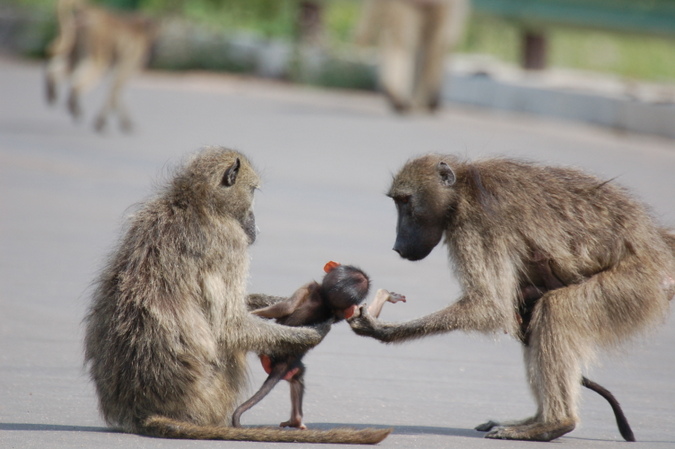
Written, and photographs, by Noelle Oosthuizen
When you take a road trip in South Africa you are bound to get to see a troop of baboons at some point. I am thrilled at every sighting, but realise that my reaction towards seeing baboons is out of the ordinary. For most people the baboons evoke very different feelings: to some they are the witches funny flying monkeys, while others harbour a more intense dislike for them, usually over a past picnic invasion.
The historical legacy of animosity that exists between people and baboons has resulted in them becoming a highly prosecuted primate species, and every year countless baboons are trapped, poisoned, and killed. The amount of orphaned baby baboons flooding into sanctuaries, after their troop was shot, gives us an indication of just how many are being killed.
At the beginning of this year I had the privilege of spending time with an orphan baby baboon. I was told that her mother was shot because she was pulling up water pipes on the farm. There was a drought. She was thirsty. This little baby was orphaned over water. This broke my heart.
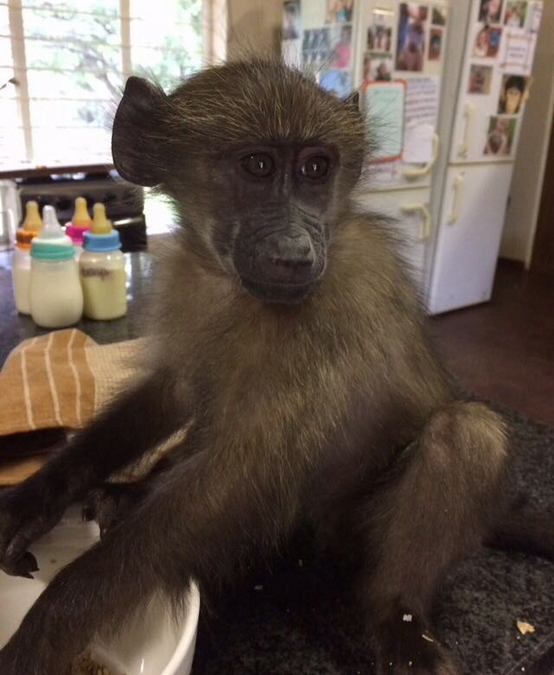
Human-baboon conflict
The human-baboon conflict that results in baboons being killed, is largely due to the fact, that as humans we struggle to inhabit the same space as a primate that is just as opportunistic as we are. Practically speaking, sharing space with a troop of chacma baboons is not an easy task. Baboons will make use of whatever food source they have easy access to, be that your veggie patch or the fruit bowl on your kitchen counter.
Reducing conflict with baboons requires keeping food out of site, using baboon proof bins, putting bars on the windows and covering the compost heap. This does require a significant investment, but it can prove to be a highly rewarding one.
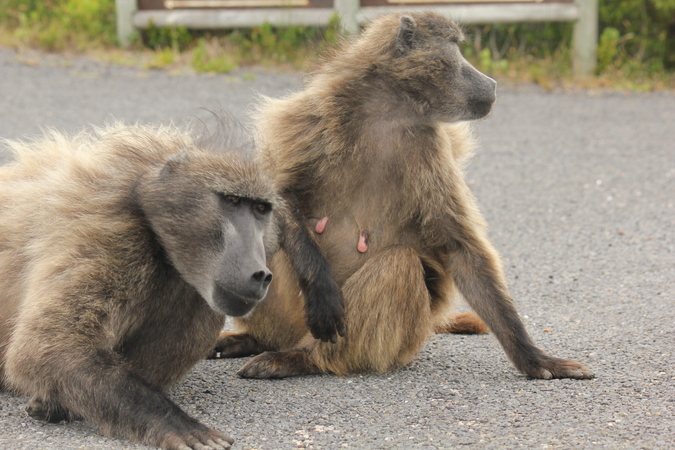
Baboons are after all very much a part of the nature that we so desperately want to have on our doorstep. As humans we’ve found that it is much more convenient to take the wildlife out of nature, as so many eco-villages and conservation towns have ironically done. But besides crippling a once thriving ecosystem, we are also cheating ourselves of the full experience.
I don’t intend to make living near wildlife sound idyllic, for the most part it’s messy, and unruly, with brief moments of wonder thrown in. And having to clean up your house after these unwelcome guests is as unpleasant, and smelly, as it sounds. But it should serve as a small shred of consolation, if not pride, that you have evidence that you live near wildlife, actual wildlife, that some people will live their entire lifetimes seeing only in books. There are people who have become resilient when it comes to sharing space with baboons, adopting a ‘live and let live’ type policy that results in almost-harmonious co-existence. But these special people are few and far between, and this means big trouble for the baboons.
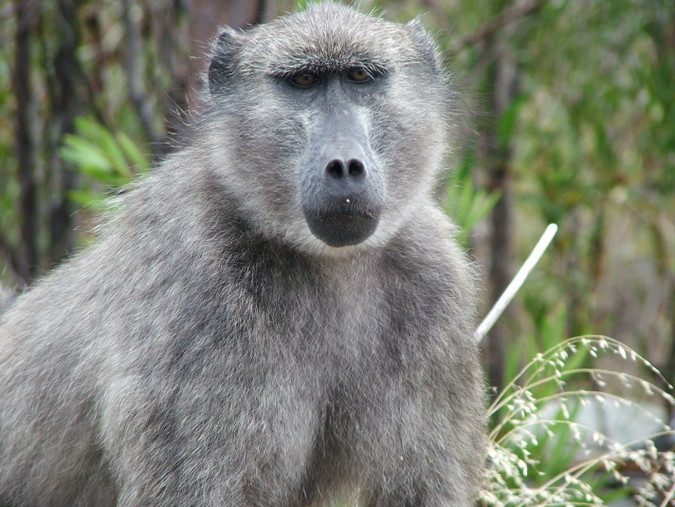
Baboons management
The current state of baboon management in South Africa paints a bleak future for the species. The troops in the Western Cape are protected by law, so cannot be killed by citizens, but this does not mean a peaceful existence for them. The authorities that oversee the 11 troops in the Cape Peninsula employ aggressive and lethal management tactics, in their efforts to control the baboons raiding behaviour.
In the greater South Africa baboons are afforded even less protection. They are viewed as vermin by many farmers and corporations, which results in them being trapped, shot, and poisoned, often in large numbers. Then there are the effects of global warming, more severe droughts and more intense fire seasons, placing further pressure on the baboon troops. Chacma baboons are currently listed as least concern on the CITES Red List, but despite this their position as a species appears to be vulnerable. A proper, independent, scientific population count has not been conducted in recent years. And much like the black-backed jackal they are often killed in such large numbers that there are bound to be population sinks occurring in pockets around the country.
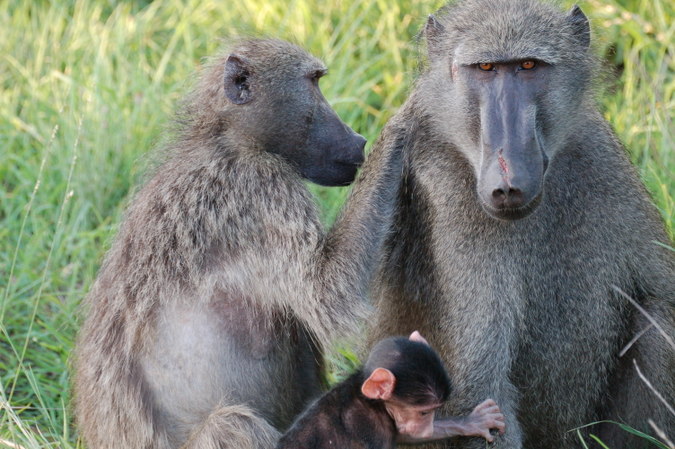
Baboon education
A key tool in the preservation of this polarised species is education. Baboon Matters, an NGO, took guests on ‘baboon walks’ where they could spend the morning up on the mountain with a free-roaming baboon troop. I went on my first baboon walk for my tenth birthday, and it was everything a ten-year-old wildlife enthusiast could have wished for. Getting to sit in the middle of a troop, and being let into the secret life of baboons was incredible. I remember the famous ‘Eric’ baboon sitting just two metres away on a rock. He looked just as majestic as a male lion in his prime.
The baboons didn’t mind us, and went about their day foraging, grooming, asserting dominance, forging friendships, and most importantly playing. For those guests who felt haunted by their past baboon encounters, the walks provided an opportunity to spend time with baboons in a non-threatening environment. And for those enigmatic few who already loved the baboons – that love just deepened.
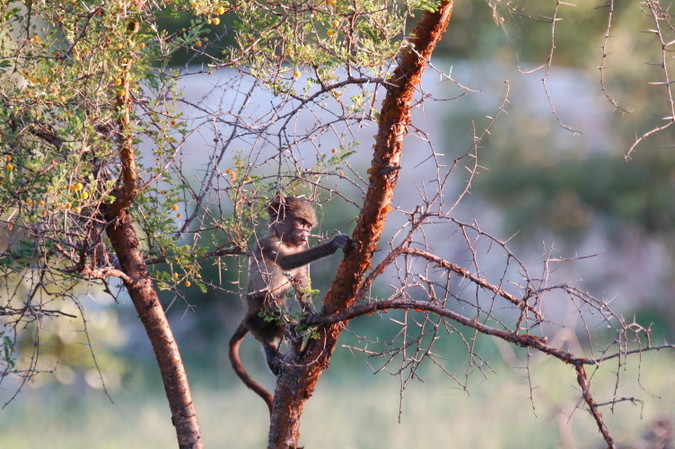
No one was allowed to take food up the mountain, and the baboons chose the distance between them and us. I’ve always considered these rules as an interesting conservation model, as with them in place, there was never any conflict between humans and baboons. And while the tourism revenue from those walks could never have competed with big game viewing, everyone who went on the walks treasured their experience. Often coming back again, and again, just to get to spend another hour with their primate cousins.
That was until the baboon walks were shut down. In my opinion, this was a great loss for everyone involved. Those walks did something that was not being done anywhere else in the Western Cape; they consciously facilitated a positive experience between humans and baboons.
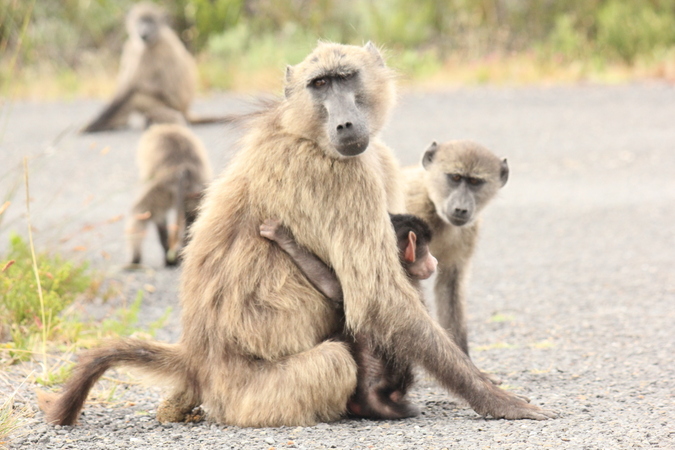
Baboons and farmers
When you move outside the Western Cape, the battlefield for the baboon’s changes, from the urban edge to vast expanses of farmland. When I spoke to some farmers in the Northern Cape, the conversation moved from baboons to jackal, and back again. Equally troublesome and equally despised, very few farmers see any value in keeping either of them alive. In all fairness farming is very hard work, and wild animals like baboons and jackal can do a great deal of damage.
Luckily, non-violent solutions exist, and span from covering crops, to managing waste, to utilising properly trained baboon monitors and Anatolian shepherd dogs. These solutions are effective but they require hard work in exchange for humane practice. There are also a handful of farmers who appear to have struck a deal with the baboons. The agreement is that every day the baboons will make their best attempt to raid, while the farmers promise to chase them off as soon as they see them, and the baboons consequently agree to run off with as much loot as they can carry in their cheek pouches. And while these antics sound lighthearted enough, I feel it is important to honour the immense dedication, and commitment, these extraordinary farmers have to conservation.
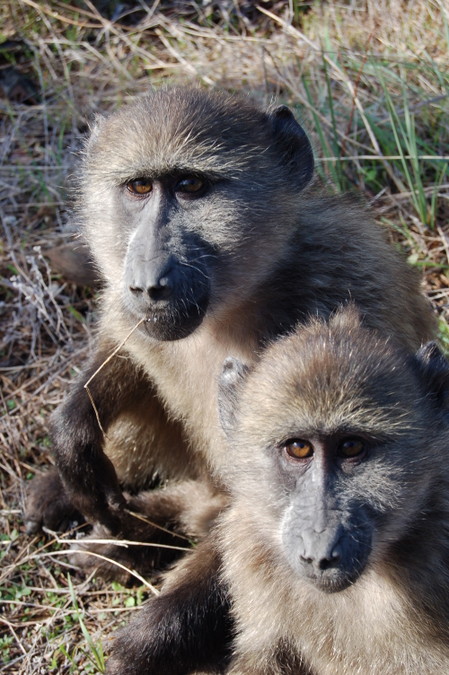
The goal with baboon conservation is always to find solutions that support both people and baboons, and a solution that serves only one party will always be destructive in the long term. Baboons provide us with a wonderful opportunity to innovate further around human-wildlife conflict, and to find non-violent solutions that have the potential to advance other areas of conservation as well. And despite the fact that baboons are killed on a daily basis around the country, I remain optimistic, because every once in a while I meet someone who is just as excited to see the baboons as I am.
HOW TO HELP
If you want to help the baboons start by letting people know you want them around. Every time you stay on a farm in South Africa or go to a game reserve ask where the baboons are and make a point of trying to catch a sighting of the troop. And if you would like to make a monetary contribution towards the baboon’s future you can donate to two very worthy organisations: Baboon Matters and Prime Crew.

Written, and photographs, by Noelle Oosthuizen
When you take a road trip in South Africa you are bound to get to see a troop of baboons at some point. I am thrilled at every sighting, but realise that my reaction towards seeing baboons is out of the ordinary. For most people the baboons evoke very different feelings: to some they are the witches funny flying monkeys, while others harbour a more intense dislike for them, usually over a past picnic invasion.
The historical legacy of animosity that exists between people and baboons has resulted in them becoming a highly prosecuted primate species, and every year countless baboons are trapped, poisoned, and killed. The amount of orphaned baby baboons flooding into sanctuaries, after their troop was shot, gives us an indication of just how many are being killed.
At the beginning of this year I had the privilege of spending time with an orphan baby baboon. I was told that her mother was shot because she was pulling up water pipes on the farm. There was a drought. She was thirsty. This little baby was orphaned over water. This broke my heart.

Human-baboon conflict
The human-baboon conflict that results in baboons being killed, is largely due to the fact, that as humans we struggle to inhabit the same space as a primate that is just as opportunistic as we are. Practically speaking, sharing space with a troop of chacma baboons is not an easy task. Baboons will make use of whatever food source they have easy access to, be that your veggie patch or the fruit bowl on your kitchen counter.
Reducing conflict with baboons requires keeping food out of site, using baboon proof bins, putting bars on the windows and covering the compost heap. This does require a significant investment, but it can prove to be a highly rewarding one.

Baboons are after all very much a part of the nature that we so desperately want to have on our doorstep. As humans we’ve found that it is much more convenient to take the wildlife out of nature, as so many eco-villages and conservation towns have ironically done. But besides crippling a once thriving ecosystem, we are also cheating ourselves of the full experience.
I don’t intend to make living near wildlife sound idyllic, for the most part it’s messy, and unruly, with brief moments of wonder thrown in. And having to clean up your house after these unwelcome guests is as unpleasant, and smelly, as it sounds. But it should serve as a small shred of consolation, if not pride, that you have evidence that you live near wildlife, actual wildlife, that some people will live their entire lifetimes seeing only in books. There are people who have become resilient when it comes to sharing space with baboons, adopting a ‘live and let live’ type policy that results in almost-harmonious co-existence. But these special people are few and far between, and this means big trouble for the baboons.

Baboons management
The current state of baboon management in South Africa paints a bleak future for the species. The troops in the Western Cape are protected by law, so cannot be killed by citizens, but this does not mean a peaceful existence for them. The authorities that oversee the 11 troops in the Cape Peninsula employ aggressive and lethal management tactics, in their efforts to control the baboons raiding behaviour.
In the greater South Africa baboons are afforded even less protection. They are viewed as vermin by many farmers and corporations, which results in them being trapped, shot, and poisoned, often in large numbers. Then there are the effects of global warming, more severe droughts and more intense fire seasons, placing further pressure on the baboon troops. Chacma baboons are currently listed as least concern on the CITES Red List, but despite this their position as a species appears to be vulnerable. A proper, independent, scientific population count has not been conducted in recent years. And much like the black-backed jackal they are often killed in such large numbers that there are bound to be population sinks occurring in pockets around the country.

Baboon education
A key tool in the preservation of this polarised species is education. Baboon Matters, an NGO, took guests on ‘baboon walks’ where they could spend the morning up on the mountain with a free-roaming baboon troop. I went on my first baboon walk for my tenth birthday, and it was everything a ten-year-old wildlife enthusiast could have wished for. Getting to sit in the middle of a troop, and being let into the secret life of baboons was incredible. I remember the famous ‘Eric’ baboon sitting just two metres away on a rock. He looked just as majestic as a male lion in his prime.
The baboons didn’t mind us, and went about their day foraging, grooming, asserting dominance, forging friendships, and most importantly playing. For those guests who felt haunted by their past baboon encounters, the walks provided an opportunity to spend time with baboons in a non-threatening environment. And for those enigmatic few who already loved the baboons – that love just deepened.

No one was allowed to take food up the mountain, and the baboons chose the distance between them and us. I’ve always considered these rules as an interesting conservation model, as with them in place, there was never any conflict between humans and baboons. And while the tourism revenue from those walks could never have competed with big game viewing, everyone who went on the walks treasured their experience. Often coming back again, and again, just to get to spend another hour with their primate cousins.
That was until the baboon walks were shut down. In my opinion, this was a great loss for everyone involved. Those walks did something that was not being done anywhere else in the Western Cape; they consciously facilitated a positive experience between humans and baboons.

Baboons and farmers
When you move outside the Western Cape, the battlefield for the baboon’s changes, from the urban edge to vast expanses of farmland. When I spoke to some farmers in the Northern Cape, the conversation moved from baboons to jackal, and back again. Equally troublesome and equally despised, very few farmers see any value in keeping either of them alive. In all fairness farming is very hard work, and wild animals like baboons and jackal can do a great deal of damage.
Luckily, non-violent solutions exist, and span from covering crops, to managing waste, to utilising properly trained baboon monitors and Anatolian shepherd dogs. These solutions are effective but they require hard work in exchange for humane practice. There are also a handful of farmers who appear to have struck a deal with the baboons. The agreement is that every day the baboons will make their best attempt to raid, while the farmers promise to chase them off as soon as they see them, and the baboons consequently agree to run off with as much loot as they can carry in their cheek pouches. And while these antics sound lighthearted enough, I feel it is important to honour the immense dedication, and commitment, these extraordinary farmers have to conservation.

The goal with baboon conservation is always to find solutions that support both people and baboons, and a solution that serves only one party will always be destructive in the long term. Baboons provide us with a wonderful opportunity to innovate further around human-wildlife conflict, and to find non-violent solutions that have the potential to advance other areas of conservation as well. And despite the fact that baboons are killed on a daily basis around the country, I remain optimistic, because every once in a while I meet someone who is just as excited to see the baboons as I am.
HOW TO HELP
If you want to help the baboons start by letting people know you want them around. Every time you stay on a farm in South Africa or go to a game reserve ask where the baboons are and make a point of trying to catch a sighting of the troop. And if you would like to make a monetary contribution towards the baboon’s future you can donate to two very worthy organisations: Baboon Matters and Prime Crew.
"Education is the most powerful weapon which you can use to change the world." Nelson Mandela
The desire for equality must never exceed the demands of knowledge
The desire for equality must never exceed the demands of knowledge
- Richprins
- Committee Member
- Posts: 75579
- Joined: Sat May 19, 2012 3:52 pm
- Location: NELSPRUIT
- Contact:
Re: Baboon
Ja, we are the closest thing you can get to humans after the great apes. We need discipline, and carry on. 
Please check Needs Attention pre-booking: https://africawild-forum.com/viewtopic.php?f=322&t=596
- Lisbeth
- Site Admin
- Posts: 66732
- Joined: Sat May 19, 2012 12:31 pm
- Country: Switzerland
- Location: Lugano
- Contact:
Re: Baboon
Storms River Mouth 2011
"Education is the most powerful weapon which you can use to change the world." Nelson Mandela
The desire for equality must never exceed the demands of knowledge
The desire for equality must never exceed the demands of knowledge
- Lisbeth
- Site Admin
- Posts: 66732
- Joined: Sat May 19, 2012 12:31 pm
- Country: Switzerland
- Location: Lugano
- Contact:
Re: Baboon
Kruger 2012
"Education is the most powerful weapon which you can use to change the world." Nelson Mandela
The desire for equality must never exceed the demands of knowledge
The desire for equality must never exceed the demands of knowledge
- Lisbeth
- Site Admin
- Posts: 66732
- Joined: Sat May 19, 2012 12:31 pm
- Country: Switzerland
- Location: Lugano
- Contact:
Re: Baboon
Luckiest escape ever 
https://youtu.be/Qf3mWqWYYu4
https://youtu.be/Qf3mWqWYYu4
"Education is the most powerful weapon which you can use to change the world." Nelson Mandela
The desire for equality must never exceed the demands of knowledge
The desire for equality must never exceed the demands of knowledge
- Richprins
- Committee Member
- Posts: 75579
- Joined: Sat May 19, 2012 3:52 pm
- Location: NELSPRUIT
- Contact:
Re: Baboon
That was the Luvhuvhu in the 1992 drought, I think?
The crocs were FULL!
The crocs were FULL!
Please check Needs Attention pre-booking: https://africawild-forum.com/viewtopic.php?f=322&t=596


